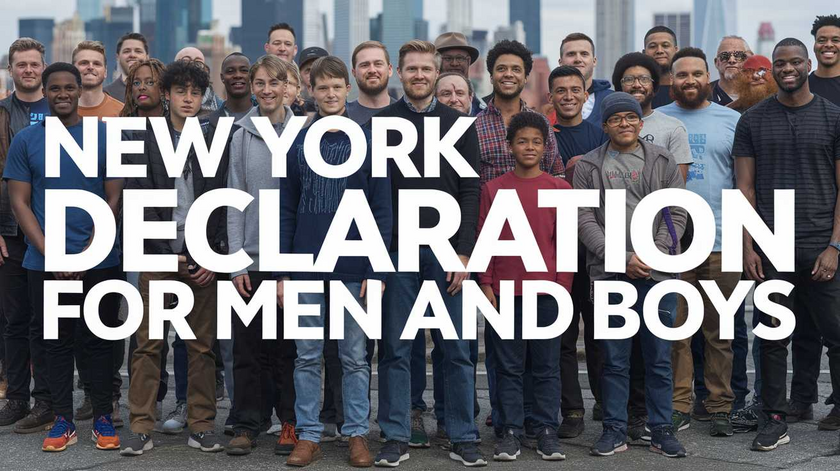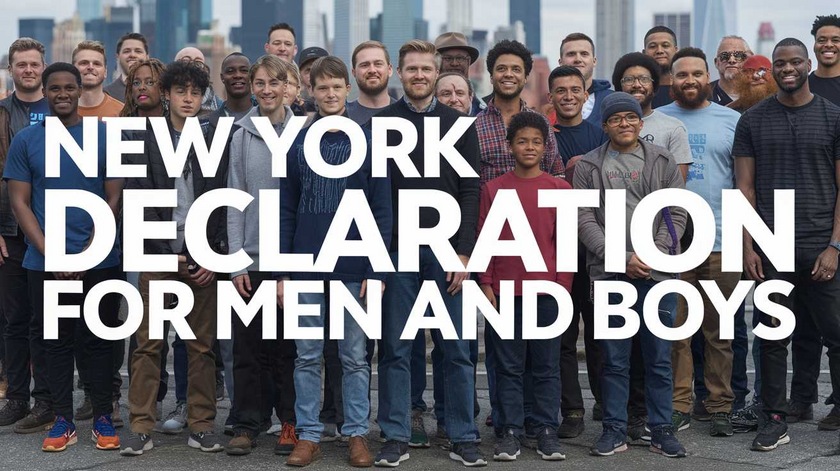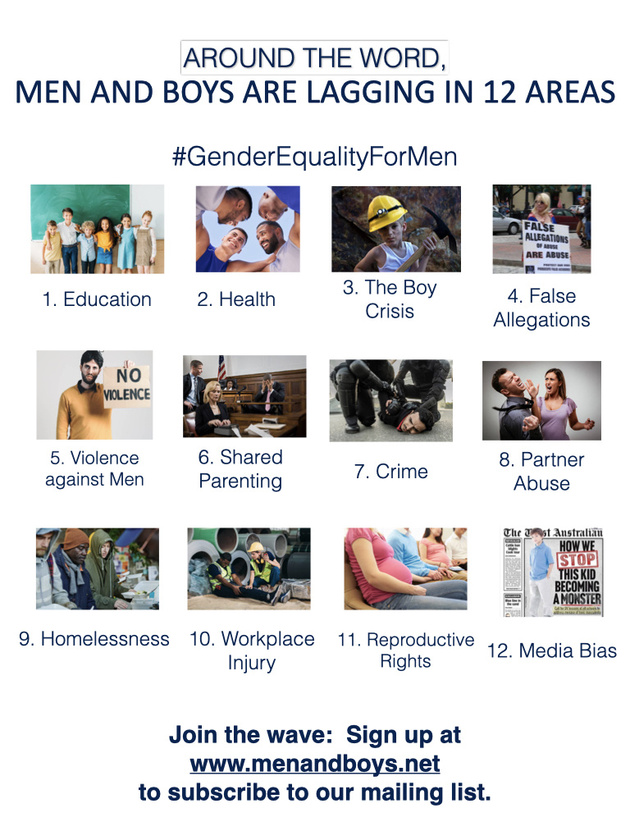
The International Council for Men and Boys (ICMB) proudly announces the launch of the New York Declaration for Men and Boys, a significant document addressing crucial global issues impacting males. Released on the 30th anniversary of the Beijing Declaration and Platform for Action, which focused on women and girls, this declaration marks a pivotal moment. It emphasizes the need for genuine equality by highlighting the perspectives and challenges faced by boys and men.
You can read the declaration below, or follow this link to the ICMB web site. Many thanks to both Ed Bartlett and Larry DeMarco for their leadership on this important document.
Please share this.
menandboys.net
New York Declaration for Men and Boys1
Preamble:
1. Gathered in New York City in the Year 2025, on the eve of the 30th anniversary of the Beijing Declaration, a landmark moment for gender equality,
2. Committed to the principles of dignity and equal opportunity for all, as enshrined in the Universal Declaration of Human Rights and other international human rights instruments,
3. Celebrating the extraordinary gains toward equality achieved for women and girls,
4. Alarmed by the profound and persistent inequities affecting men and boys globally in health, education, family life, workplace safety, justice, and other areas,2
5. Recognizing that these disparities often affect minority men more severely than other men, thereby compounding the challenges they face,
6. Asserting that the principle of gender equality requires the full inclusion of men and boys as both beneficiaries of fairness and active partners in progress,
7. Dedicated to creating a world where everyone, regardless of gender, can live with dignity, purpose, and equal opportunity,
8. Recognizing that policies and social structures that disadvantage men weaken families, communities, and society as a whole, and
9. Acknowledging that achieving gender equality benefits both men and women.
On behalf of nations, organizations, and individuals, we declare our commitment to address the following priorities for men and boys:
I. Physical Health and Well-being
10. Recognizing that men face shorter life expectancies and a far greater risk of workplace fatalities,
11. We commit to closing the health outcomes gap by:
● Ensuring that men are adequately represented as participants in health research; and
● Establishing offices of men’s health to address the understudied problems that affect the health of men and boys.
_________________________________________________
II. Mental Health and Societal Expectations
12. Recognizing that male suicide rates are, in almost all countries, far higher than female suicide rates, and that men face more mental health challenges, including addiction-related mortality and deaths of despair, and
13. Acknowledging that societal pressures can isolate men from emotional connection and support, hindering their mental well-being,
14. We commit to:
● Promoting models of masculinity that foster engagement with families, friends, colleagues and communities;
● Encouraging open dialogue about men’s emotional health by creating environments where men are at ease in seeking help; and
● Prioritizing campaigns to prevent male suicide and deaths of despair that offer effective counseling.
______________________________________________
III. Education and Lifelong Learning
15. Acknowledging that boys and young men, particularly those from marginalized communities, are disproportionately affected by shortfalls in school achievement,
16. We commit to ensuring equal access to education by:
● Increasing the representation of male teachers;
● Considering the distinctive developmental processes of boys; and
● Ensuring equal opportunity for scholarships for men.
● Overcoming learning deficiencies, literacy barriers, and dropout rates among boys;
_____________________________________________
IV. Family and Shared Parenting
17. Recognizing not only the distinctive and critical ways in which fathers contribute to the well-being of children, and also acknowledging the harm caused by systems that unjustly deny children the opportunity to maintain maximal parenting time with both parents, and
18. Noting that laws that promote equal-shared parenting -- both shared physical access and shared decision making – contribute to a broad range of improved outcomes for children.
19. We commit to:
● Reducing or eliminating financial incentives in family law that allow parents (with or without a third party) to cause or enable conflict within the family;
● Recognizing that parental alienating behaviours are a serious form of child abuse; and
● Reforming child-support laws to reduce parental conflict by reflecting the needs of modern families in which financial support and child decision making are more equally shared.
_______________________________________________________
V. Justice and Equality Before the Law
20. Acknowledging that men are disproportionately affected by biases in the arrest, charging, conviction, and punishment phases of the legal system,
21. We commit to:
● Enforcing due process in all courts and tribunals;
● Ensuring impartial investigations that rely on the presumption of innocence; and
● Reforming legal policies and procedures to prevent the harsher treatment of men in criminal and family courts.
_______________________________________
VI. Workplace Safety
22. Recognizing that men account for virtually all workplace fatalities and a majority of workplace injuries,
23. We commit to:
● Strengthening workplace safety standards and protections;
● Promoting access to non-traditional jobs for men, such as nursing and teaching; and
● Equipping men with skills and opportunities to work in emerging industries to replace jobs that have been lost due to globalization and automation.
_________________________________________
VII. Paternal Justice
24. Recognizing that men face injustice in matters of reproduction, including the lack of recourse in cases of misattributed paternity and paternity fraud, unfair child-support obligations, control over embryos that contain shared DNA, and denial of choice in cases of adoption,
25. We commit to:
● Ensuring that men and women have equal influence in decisions about frozen embryos that have been created with former partners;
● Reforming child-support systems to remedy unjust financial obligations when paternity has been disproven; and
● Promoting policies that foster fairness, dialogue, and respect in matters of reproductive justice.
________________________________________
VIII. Violence and False Allegations
26. Recognizing that men and boys are often victims of violence, abuse, and trafficking, but their experiences are often ignored or minimized, resulting in many male victims being left without access to resources and support,
27. Recognizing that hundreds of research studies confirm that men are as likely as women to be victims of domestic violence and abuse, and
28. Noting the problem of false allegations, which are more often directed against men than against women,
29. We commit to:
● Relying on evidence-based public policies that are consistent with research studies that expose the incidence, causes, and consequences of male victimization;
● Providing equitable services and protections for male victims; and
● Combating the harmful effects of false allegations.
____________________________________________________
IX. Media Portrayals
30. Recognizing that media portrayals of men in popular culture not only perpetuate harmful stereotypes of men but also ignore helpful ones,
31. We commit to:
● Highlighting men’s many contributions as leaders, builders, caregivers, and fathers;
● Promoting fair and balanced representation of men and boys in popular culture; and
● Challenging portrayals that trivialize male pain, injury, or any other form of suffering.
_____________________________________________
Conclusions
32. Recognizing that establishing these priorities requires collaboration among international organizations, governments, civil society, and individuals,
33. We urge all interested parties to:
● Work to promote gender equality for men and boys;
● Eliminate harmful stereotypes of men;
● Allocate resources for research, advocacy, and programs that address male disadvantages;
● Integrate the needs of men and boys into national and international policies.
________________________________________________
1 The New York Declaration for Men and Boys is available online at:
https://www.menandboys.net/declaration/
2 The studies and reports documenting the 12 areas of male inequality are available at
https://menandboys.net




















